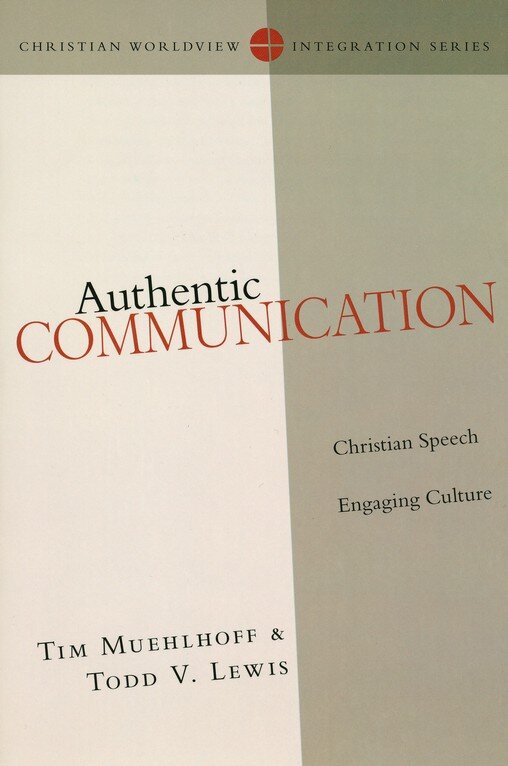Tim Muehlhoff and Todd V. Lewis, Authentic Communication: Christian Speech Engaging Culture (Christian Worldview Integration). IVP Academic, 2010.
Referenced in: Evangelism in Contemporary Culture – Special Challenges
LifeandLeadership.com Summary
It is hard to know exactly how to place this book in terms of typical ministry resource categories. It is part of the Christian Worldview Integration Series by InterVarsity Press, which seeks to help Christians in two types of integration, as defined by Francis J. Beckwith and J. P. Moreland in the preface to the series:
In conceptual integration, our theological beliefs, especially those derived from careful study of the Bible, are blended and unified with important, reasonable ideas from our profession or college major into a coherent, intellectually satisfying Christian worldview. As Augustine wisely said, “We must show our Scriptures not to be in conflict with whatever [our critics] can demonstrate about the nature of things from reliable sources.” In personal integration, we seek to live a unified life, a life in which we are the same in public as we are in private, a life in which the various aspects of our personality are consistent with each other and conducive to a life of human flourishing as a disciple of Jesus. (7-8)
The preface itself is an excellent piece on Christian communication in our current culture.
The specific issue dealt with in this volume is communication, written by two professors of communication at Biola University. One of the authors, Tim Muehlhoff, is the co-author of The God Conversation. It offers a helpful perspective on Christian communication as it relates to empathy, evangelism, persuasion, communication spirals, congregational and interpersonal conflict, Christian unity, Christianity in the public square, apologetics, and social justice.
They divide the book into two sections. Section One discusses the components of communication. This includes the complexity of communication, communication competence, the role of perceptions, the power and limitations of words and symbols, and an introduction to persuasion and rhetorical theory. All of this is designed toward helping Christians convey themselves more competently in a world that is increasingly diverse, where misperceptions readily occur, where words have such emotive value, and where we must often persuade others to adopt a viewpoint that may not only be foreign to them, but perceived as against them.
Section Two applies the concepts from Section One to select issues such as forgiveness, unity, communicating persuasively in a world full of cyber-communication, presenting an alternative view of truth in the postmodern environment, communicating as “counterpublics” where people not only disagree but may be hostile, and advocating and defending for social justice for those who have been abandoned and silenced.
This is an excellent volume that will help all who communicate the Christian message in any context.
From the Publisher
Part of the Christian Worldview Integration Series
Whether setting about to love our neighbor, to settle a dispute, to share in the suffering of others or to speak up on behalf of the marginalized, we inevitably must engage in communication. And what could be more natural, more human, than communication?
But we all learn quickly enough that good communication is not always natural. There is much to learn from Scripture and from the academic study of human communication. Tim Muehlhoff and Todd Lewis are able guides, aiding us in understanding the broad field of human communication in Christian perspective.
Here they offer readers a vital assessment of the power of words, perspective-taking, persuasion and conflict management—all in an effort to improve our abilities to communicate forgiveness and shape the world we live in for the good. Special attention is focused on the place of Christians as counterpublics—those who offer alternative perspectives to the dominant voices in society.
- Defines key communication concepts and applies them to Christian communication in contemporary world
- Offers guidance on perspective-taking, conflict resolution, persuasion, communicating forgiveness, speaking for the marginalized
- Gives special attention to communicating as counterpublics, addressing dominant culture with an alternative perspective
- Useful as text for introductory or capstone classes in communication theory and practice for communication majors at Christian institutions
Table of Contents
Part I: Understanding the Components of Communication
- The Power of Human Communication
- Perspective-Taking: Engaging the Views of Others
- Words! Words! Words!: We Can Only Imagine
- Persuasion: Spiritual Power or Manipulation and Rhetorical Tricks?
- Before the Sun Sets: Conflict and Christian Unity
Part II: Applying Communication
- Communicating Forgiveness
- Communicating About and Evaluating the Messages of Popular Culture
- Resident Aliens: Christians as Counterpublics
- Postmodern Times and Christian Counterpublics (Part 1)
- Postmodern Times and Christian Counterpublics (Part 2)
- Communication: A Christian Response to the Argument Culture
- Social Justice: Speaking for the Marginalized
About the Authors
Tim Muehlhoff (Ph.D., University of North Carolina at Chapel Hill) is an associate professor of communication at Biola University in La Mirada, California where he teaches classes in family communication, interpersonal communication and gender. Tim is the coauthor of The God Conversation: Using Stories and Illustrations to Explain Your Faith and Authentic Communication: Christian Speech Engaging Culture. He and his wife, Noreen, are frequent speakers at FamilyLife Marriage Conferences, and Tim has served with Campus Crusade since 1986. They live in Brea, California, with their three boys.
Tim has written about God, communication and faith in diverse publications such as the Journal of Religion and Communication, Journal of Social and Personal Relationships, Mars Hill Review and Discipleship Journal.
Todd Lewis (Ph.D., Louisiana State) is professor of communication studies at Biola University, where he teaches courses in history and practice of oral interpretation and has coached intercollegiate forensics.
***For additional information on this resource, including reviews, click the bookstore links. Check the reference at page top or the links below for resource guides on related topics.***
Related Areas
See Other Resources on Evangelism:
See Resources on Over 100 Areas of Ministry Leadership:


